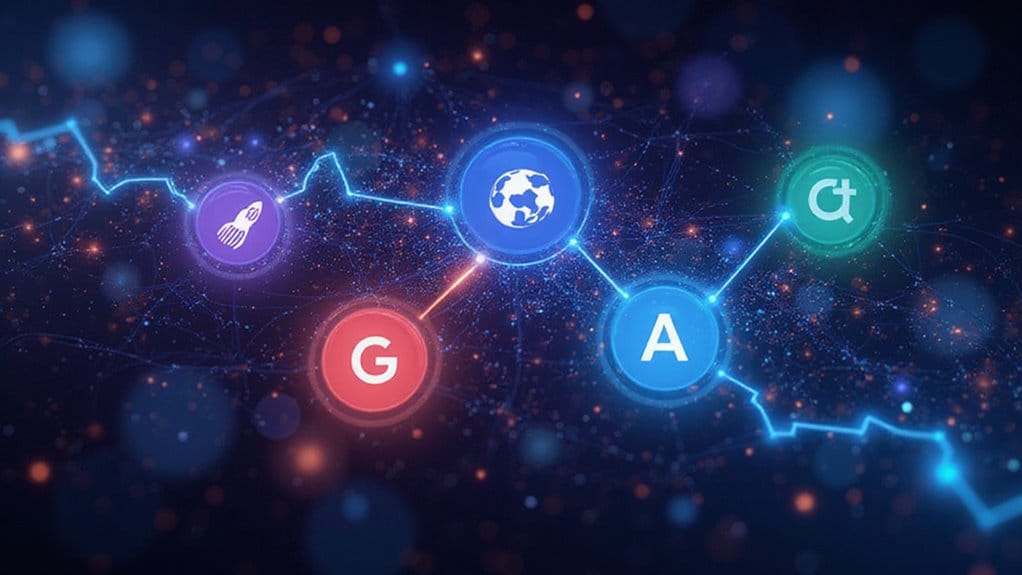AI’s essential features include perception methods, reasoning techniques, action autonomy, learning types, and problem-solving skills. It senses the world, processes information, and makes decisions—sometimes too well, if you ask a chess champion! AI learns in various ways, like trial and error (just like teaching a dog new tricks). Plus, it can chat with you, making it relatable? Become familiar with these core components, and you’ll uncover the depths of AI’s magic!

In the fascinating world of artificial intelligence, understanding its core components is like having a cheat sheet for a complex exam—extremely helpful and, dare we say, vital.
First up is perception methods. Imagine AI as a detective; it needs to gather clues from its environment. This is where sensors like cameras and microphones come in. These devices collect data, allowing AI to recognize objects and understand their spatial relationships. Think of it as the AI’s eyes and ears! Additionally, custom outlines provide a structured framework that can enhance how AI organizes and processes information. Furthermore, AI systems utilize neural network architectures to process visual and auditory data more effectively.
But wait, software-based agents also perceive data through APIs and databases—sometimes it’s all about the digital interactions.
Next, we explore reasoning techniques. Once AI has gathered its clues, it must analyze them. This is where rule-based systems and machine learning strut their stuff, enabling AI to identify patterns and make decisions. It’s like having a super-smart friend who can deduce outcomes based on the information provided—talk about impressive! AI agents can analyze vast amounts of data quickly, enhancing the decision-making process.
Reasoning techniques empower AI to analyze gathered clues, identify patterns, and make impressive decisions—like having a super-smart friend by your side!
But don’t forget action autonomy, which allows AI to take initiative based on its perception and reasoning. Whether it’s a robot performing a task or a smart home adjusting the thermostat, these actions have real-world impacts.
Now, let’s not overlook learning types, essential for AI’s evolution. With supervised, unsupervised, and reinforcement learning, AI improves over time. Imagine training a puppy; it learns from feedback, just like AI does.
Then, we have problem-solving strategies. AI takes on complex challenges, from beating chess champions to optimizing solutions in finance—talk about multitasking!
Finally, language understanding is the cherry on top. Through Natural Language Processing, AI can converse with humans, making communication seamless. From virtual assistants to translation services, this capability is invaluable.
Frequently Asked Questions
How Does AI Impact Job Markets and Employment Opportunities?
AI is shaking up job markets like a snow globe! Job displacement is real, with automation snatching away roles, especially in retail.
But don’t panic! Skill enhancement is key. Embrace new opportunities in AI development and data analysis.
Get curious, learn complex problem-solving, and boost your resilience! The job landscape is evolving—be ready to adapt or get left behind.
What Ethical Concerns Surround the Development of AI Technologies?
The development of AI technologies raises significant ethical concerns.
First, bias mitigation is essential; otherwise, AI might unfairly target certain groups.
Next, privacy issues loom large—massive data collection can lead to misuse.
Remember, unchecked AI can influence behaviors and invade personal space!
It’s time to demand transparency and accountability in AI systems.
Are you ready to hold developers responsible?
If not, brace yourself for a future filled with ethical dilemmas and unintended consequences!
How Can I Start Learning About AI and Its Components?
To plunge into AI, start with solid AI resources and learning platforms like DataCamp or Google AI Essentials.
First, master the math—linear algebra and statistics are your friends!
Then, learn Python; it’s the go-to language.
Ready for action? Tackle hands-on projects, like image processing or chatbot creation.
Remember, understanding data is key! Don’t just read—do!
Embrace the journey, and avoid the pitfalls of neglecting the fundamentals.
Your future self will thank you!
What Industries Benefit Most From AI Integration?
Industries benefiting the most from AI integration include healthcare and finance.
In healthcare advancements, AI analyzes medical images, enhancing diagnostics.
Meanwhile, financial analytics leverages real-time data for risk management and fraud detection.
These sectors are not just improving; they’re transforming!
So, if you’re curious about AI’s impact, immerse yourself!
Don’t wait; the future is here, and it’s powered by smart technology.
Explore these fields now or risk being left behind!
Are There Any Regulations Governing AI Development and Usage?
AI regulations are finally catching up with technology, but don’t hold your breath. Various compliance frameworks are emerging, especially at the state level.
For example, Colorado’s AI Act tackles algorithmic discrimination. Meanwhile, Congress is debating proposals that balance innovation with safety.









